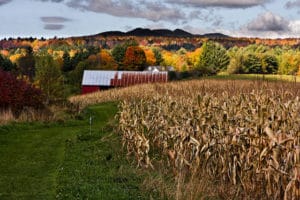American Farmland Trust
Contact: Cris Coffin, Policy Director, Land for Good
 |
Nearly 30 percent of New England’s farmers are likely to exit farming in the next 10+ years, and nine out of ten are farming without a young farmer alongside them. This is according to new analysis of U.S. Census of Agriculture data that was part of a study released in April by American Farmland Trust (AFT) and Land For Good (LFG). The year-long study—that also included farmer focus groups—sheds new light on what will be needed to facilitate the transition of farms and farmland in New England to a next generation of farmers. At no point is a farm’s future more at risk than during this transition.
92 percent of New England’s 10,369 senior farmers do not have a farm operator under age 45 working with them. While this does not mean that these farmers don’t have a succession plan, it suggests that the future of many of these farms is uncertain.
“It was a real wake-up call to see how few farmers age 65+ have a next generation working on the farm with them,” said Cris Coffin, Policy Director for Land For Good, who directed the study. “How and to whom this land and farm infrastructure transfers will have an enormous impact on the future of farming in New England.”
Based on focus groups with farmers, the study documents that older farmers are concerned about retirement; especially those farmers without a next generation farmer or owner to take over. Farmers are also unsure about how to find a younger farmer who can afford to buy their land. Many also want help to make sound transfer agreements.
According to the study, 30 percent of New England’s farmers are likely to exit farming over the next 10-20 years. “The 1.4 million acres they manage and $6.45 billion in land and agricultural infrastructure they own will change hands in one way or another,” said Coffin. “To keep this land and infrastructure in farming as it transitions, we will need better policy tools and increased support services to exiting and entering farmers.”
Using Census of Agriculture data (2002, 2007 and 2012), AFT and LFG analyzed the characteristics of retiring and beginning farmers in New York and the six New England states. In all seven states, AFT and LFG conducted focus groups of older farmers who self-identified as having no farm successor. The goal was to learn more about what these farmers are farming and with whom, their vision of retirement, and what challenges they see for the future.
“Some senior farmers may have a plan for their farm’s future,” said Jesse Robertson-DuBois, New England Director for American Farmland Trust. “But we learned through this study that many do not. A large number of older farmers are worried about their ability to retire and to find a younger farmer who can afford to buy their land.”
Older farmers who participated in the focus groups all want to see their land remain in farming, though most see financing and future economic viability for younger farmers as an obstacle. Farmers identified their needs for help to navigate the complex process of choosing the right succession strategy and finding a suitable successor. Many also want technical assistance on specific aspects of farm succession and transfer.
A surprising finding, a significant majority of beginning farmers are also not young: 62 percent of New England’s beginning farmers are 45 or older. Comparing beginners 45+ to beginners under 45, on average older beginners farm slightly less acreage (63 acres compared to 73) and generated less in agricultural sales in 2012 ($23,000 compared to $37,000). The average net farm income for older beginners in 2012 was negative, at−$7,000; for younger beginners, it was a positive $5,000. These findings also have important implications for services and policies needed for beginning farmers.
Additional information about the study and a profile of findings from each state can be found on the American Farmland Trust and Land For Good websites at www.farmland.org/gaininginsights or www.landforgood.org/gaininginsights.
American Farmland Trust is the only national conservation organization dedicated to protecting farmland, promoting sound farming practices and keeping farmers on the land. Since 1980 American Farmland Trust has helped to permanently protect more than five million acres of farm and ranch land. Learn more at www.farmland.org.
Land For Good is the only organization specialized in farmland access, tenure and transfer—and they are on the ground in all New England states. Since 2004, Land For Good has helped hundreds of farmers and farm families find innovative solutions that keep their farms in farming and provide a meaningful legacy. Learn more at www.landforgood.org.

